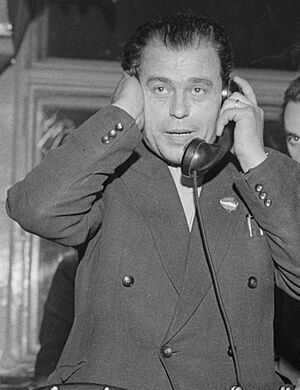József Dudás facts for kids
József Dudás (born September 22, 1912 – died January 19, 1957) was an important Hungarian politician. He was also a resistance fighter who stood up for his beliefs.
Early Life
József Dudás was born in a town called Marosvásárhely. This town was in Austria-Hungary at the time. Today, it is known as Târgu Mureş and is in Transylvania, Romania.
When he was very young, he joined a political group. This group, the Communist Party, was not allowed in Transylvania then. In 1933, he was arrested for his involvement. He was sentenced to spend nine years in prison.
In 1940, a part of Transylvania became part of Hungary. This happened because of something called the Second Vienna Award. Dudás was then released from prison. After his release, he moved to Budapest, the capital of Hungary.
During World War II
During World War II, József Dudás was active in a movement. This movement was against fascism, a type of strict government. He helped different groups work together.
When the war ended, Dudás was part of a group. This group tried to arrange a ceasefire, which means stopping the fighting. They even visited Moscow. He also helped start a group called the Liberation Committee. This group was about a Hungarian national uprising.
In late 1945, he joined a political party. It was called the Independent Smallholders' Party. He was then chosen to be part of the government in Budapest. Later, another political group, the communists, tried to take control of Hungary. Dudás was arrested during this time. He was held until 1951. Then, he was given to the Romanian state security. He was released in 1954 and went back to Hungary.
Role in the Hungarian Revolution
In 1956, József Dudás was working as an engineer. Then, the Hungarian Revolution of 1956 began. This was a big uprising against the government. Dudás started speaking to large crowds of people.
On October 29, he created a group called the Second District National Committee. This group had a plan with 25 points. They wanted a government where different parties worked together. They also wanted more than one political party. And they wanted Hungary to be neutral, meaning it wouldn't take sides in big world conflicts.
Dudás also started his own newspaper. It was called Magyar Függetlenség, which means Hungarian Independence. The main headline of his paper was, "We do not recognize the present government!" Around this time, a group of about 400 armed men formed. They were known as the "Dudás Group."
There were some interesting stories about Dudás during the revolution. Some people said he had a lot of money. There were also rumors that he had a place to question members of the AVH, which was Hungary's secret police. Some thought Dudás wanted to take over the government himself.
Because of these rumors, another leader, General Kiraly, ordered Dudás's men to arrest him. This was for actions that were seen as "counter-revolutionary." These actions included an attack on the Foreign Ministry and taking things from the National Bank. Once Dudás was arrested, his men left the building. He was later released. The government wanted it to look like they were stopping threats. This was to make the Russian Communists happy.
On November 4, Dudás was hurt and taken to a hospital. On November 21, he was tricked into going to the Parliament building. There, he was arrested by the Soviets. He was accused of leading a plot against the government. On January 14, 1957, he was sentenced to death. The sentence was carried out on January 19, 1957.
 | Shirley Ann Jackson |
 | Garett Morgan |
 | J. Ernest Wilkins Jr. |
 | Elijah McCoy |


